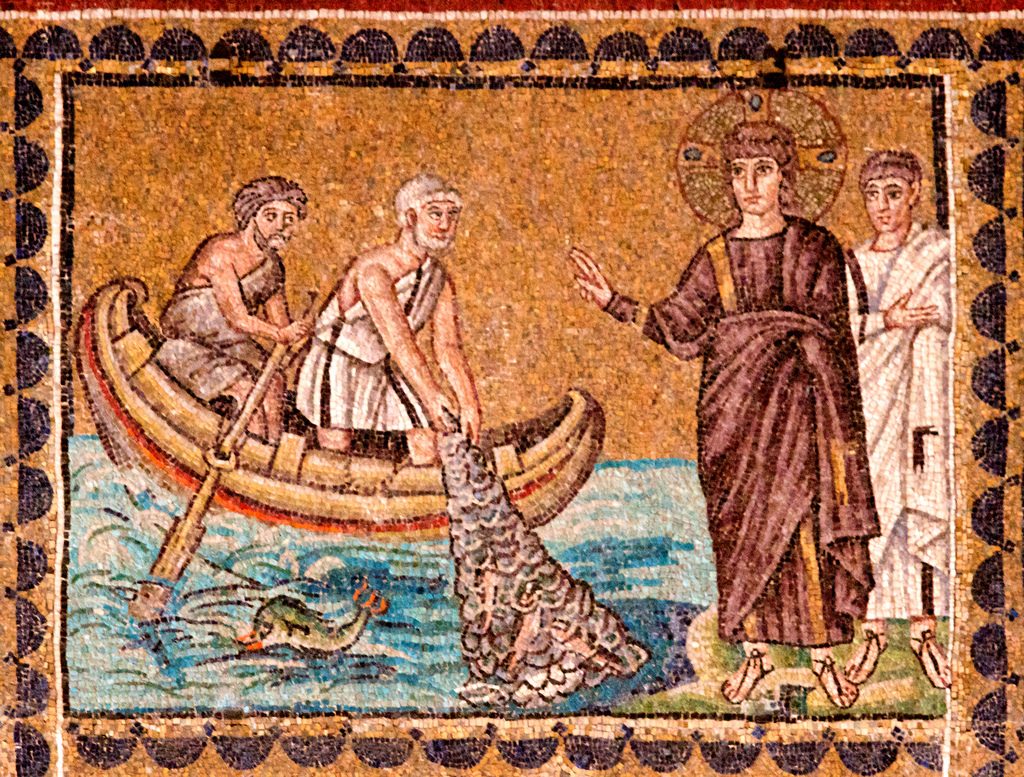 Since we have been talking about “fishing for men” and how it can be interpreted in different ways . . .
Since we have been talking about “fishing for men” and how it can be interpreted in different ways . . .
- Jindrich Mánek postulates that Jer 16:16 and cosmological myths involving the sea elucidate a sense of rescue in the expression [i.e. “fishers of men”].
- Charles W. F. Smith argues that the dark motif of judgment in the Hebrew prophets and Qumran literature supplies the expression with an ominous ring.
- Wilhelm Wuellner suggests that the multivalent usage of fishing in antiquity informs the call of disciples as one denoting partnership in Jesus’ eschatological mission.
- And J. Duncan M. Derretí posits that the expression is derived from Ezekiel 47.
- More recently, Joel Marcus has synthesized much of the relevant scholarship:
There may not be any need to choose among these different interpretations; the disciples’ fishing for people is probably a multivalent image that includes their future missionary preaching, their future teaching, and their future exorcisms (cf. 3:14-15; 6:7,12-13, 30; 13:9-10), all of which are understood as a participation in God’s eschatological war against demonic forces; this war, moreover, recapitulates God’s redemption of Israel from Egyptian bondage.
(Wassell 637, my formatting; my bolding in all quotations)
There was once a time when I thought the idea of “fishing for men” was not a particularly irenic image, certainly not for the fish or for comparing people to fish being pulled, gasping, out of the water to die a slow death. I recall trying to rationalize the metaphor. We are “alive in our sins in the world” today and have to “die” or “mortify the flesh” in order to live a new life in a new kingdom. But that didn’t really work because the image offers no pleasant lease of life for the fish.
There was once a time when I felt that the original metaphor as found in Jeremiah 16:16 was more judgmental than pastoral. Sure, if one reads the verse in the context of the previous two or three it does sound quite positive, presenting Jeremiah’s readers with a scene of drawing lost Israelites back from captivity to a restored happy kingdom:
14 Therefore, behold, the days come, saith the Lord, that it shall no more be said, The Lord liveth, that brought up the children of Israel out of the land of Egypt;
15 But, The Lord liveth, that brought up the children of Israel from the land of the north, and from all the lands whither he had driven them: and I will bring them again into their land that I gave unto their fathers.
16 Behold, I will send for many fishers, saith the Lord, and they shall fish them;
Reading in context
But when I studied the Book of Jeremiah more attentively I had to discard that shallow interpretation. In its fuller context the image is one of judgement.
10 And it shall come to pass, when thou shalt shew this people all these words, and they shall say unto thee, Wherefore hath the Lord pronounced all this great evil against us? or what is our iniquity? or what is our sin that we have committed against the Lord our God?
11 Then shalt thou say unto them, Because your fathers have forsaken me, saith the Lord, and have walked after other gods, and have served them, and have worshipped them, and have forsaken me, and have not kept my law;
12 And ye have done worse than your fathers; for, behold, ye walk every one after the imagination of his evil heart, that they may not hearken unto me:
13 Therefore will I cast you out of this land into a land that ye know not, neither ye nor your fathers; and there shall ye serve other gods day and night; where I will not shew you favour.
Verses 14-15 are in interpolation from Jeremiah 23:7-8 7
14 Therefore, behold, the days come, saith the Lord, that it shall no more be said, The Lord liveth, that brought up the children of Israel out of the land of Egypt;
15 But, The Lord liveth, that brought up the children of Israel from the land of the north, and from all the lands whither he had driven them: and I will bring them again into their land that I gave unto their fathers.
16 Behold, I will send for many fishers, saith the Lord, and they shall fish them; and after will I send for many hunters, and they shall hunt them from every mountain, and from every hill, and out of the holes of the rocks.
17 For mine eyes are upon all their ways: they are not hid from my face, neither is their iniquity hid from mine eyes.
The image of fishing is associated now with the image of pulling people out of their land and exiling them to “a land they know not”. It is no longer an image of salvation but an image of judgment.
Contrast the Gospels of Luke and John
But in certain of the gospels it clearly is an image of salvation. Continue reading “The Different Meanings of “Fishers of Men””
